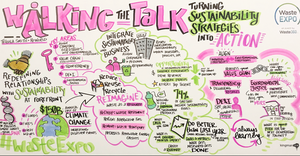Fayetteville PWC and Bloom Energy to Transform Waste into Clean Community Electricity
May 6, 2022

FAYETTEVILLE, N.C. & SAN JOSE, Calif. --The Fayetteville Public Works Commission (PWC) and Bloom Energy (NYSE: BE), a leading distributed energy company, today announced plans to install and operate 1.5 megawatts of solid oxide fuel cells. Creating renewable energy from multiple biogas streams in the region, the new project will reduce emissions and advance the Fayetteville community’s efforts to meet North Carolina’s clean energy standards.
Bloom Energy’s fuel cells combine ambient air with fuel, such as biogas, to create electricity without combustion. Generating power from multiple biogas streams, the fuel cell installation – to be located adjacent to PWC’s P.O. Hoffer Water Treatment Facility – will be one of the first of its kind to blend multiple waste gas sources to produce clean, carbon-neutral electricity. The project will use biogas captured from PWC’s Cross Creak Water Reclamation facility, an adjacent landfill, and methane gases captured from local and neighboring swine farms.
As nations and cities continue to grow and urbanize, waste generation is expected to increase by 70 percent by 2050. Currently, waste gas generated from the wastewater treatment process and landfills is flared, a commonly used and controlled method for releasing the gas into the atmosphere, which contributes to air pollution. By reducing biogas flaring at the wastewater and landfill facilities, local emissions are averted, helping to improve air quality. The project will also use methane -- a potent greenhouse gas that accounts for 50 to 70 percent of biogas – from swine farms that would otherwise be released into the atmosphere.
By utilizing multiple biogas streams, the waste-to-electricity project will provide reliable, always-on, and carbon-neutral electricity to meet the power demands equivalent to more than 1,000 homes. Bloom Energy’s fuel cells will complement PWC’s existing renewable energy sources, helping meet PWC’s North Carolina Renewable Energy and Energy Efficiency Portfolio Standard requirements.
“PWC is excited to collaborate with Bloom Energy to bring a first-of-its kind clean energy project to our community to serve our customers,” said Elaina Ball, CEO and general manager, PWC. “This project is an anchor for the broader plan to remediate and establish a Cleanfields Renewable Energy Demonstration Park in the community.”
“Producing resilient and renewable energy from waste sources is a critical component of decarbonized and sustainable circular economy,” said Chuck Moesta, vice president, gas management, Bloom Energy. “Our waste-to-energy solutions are garnering increasing interest from communities and municipalities. We look forward to bringing this innovative project alive with Fayetteville's municipal utility, setting an important example for other communities around the U.S. wishing to transition to clean, carbon-neutral energy.”
“This is an innovative project that addresses both our challenging renewable energy mandates and one of the state’s largest industrial polluted sites,” said Ball. “We are excited that the project not only brings creative solutions but numerous other benefits including producing renewable energy, cutting power costs and productive use of local waste gases.”
The project will also complement the cleanup of industrial pollution that has threatened the Fayetteville community for more than two decades. Located adjacent to PWC’s P.O. Hoffer Water Treatment Facility, the fuel cell installation will also border the former Texfi industrial site, which is considered one of North Carolina’s most polluted sites due to residual industrial pollution and contaminated groundwater that poses a threat to the community’s drinking water and the Cape Fear River Basin.
Forward-Looking Statements
This press release contains certain forward-looking statements, which are subject to the safe harbor provisions of the Private Securities Litigation Reform Act of 1995. Forward-looking statements generally relate to future events or our future financial or operating performance. In some cases, you can identify forward-looking statements because they contain words such as “anticipate,” “believe,” “could,” “estimate,” “expect,” “intend,” “may,” “should,” “will” and “would” or the negative of these words or similar terms or expressions that concern Bloom’s expectations, strategy, priorities, plans or intentions. These forward-looking statements include, but are not limited to, Bloom’s expectations regarding the collaboration with PWC for the waste-to-electricity project, including plans to install solid oxide fuel cells; biogas and methane gas capture; emissions reductions and air quality improvements; ability of the project to meet power demands; and progress towards any clean energy standards. More information on potential risks and uncertainties that may impact Bloom’s business are set forth in Bloom’s periodic reports filed with the SEC, including its Annual Report on Form 10-K for the year ended December 31, 2020, filed with the SEC on February 25, 2022, as well as subsequent reports filed with or furnished to the SEC from time to time. Bloom assumes no obligation to, and does not currently intend to, update any such forward-looking statements.
About Fayetteville PWC
Fayetteville PWC is the largest Public Power provider in North Carolina and the 37th largest in the United States. Serving more than 85,000 electric customers. PWC has been recognized by the American Public Power Association as winners of the E.F. Scattergood System Achievement Award for sustained achievement and customer service, three-time recipients of the APPA Energy Innovator Award and six-time recipients of the RP3 (Reliable Public Power Provider) Diamond Designation for outstanding electric system reliability. Learn more about PWC at www.faypwc.com.
About Bloom Energy
Bloom Energy empowers businesses and communities to responsibly take charge of their energy. The company’s leading solid oxide platform for distributed generation of electricity and hydrogen is changing the future of energy. Fortune 100 companies around the world turn to Bloom Energy as a trusted partner to deliver lower carbon energy today and a net-zero future. For more information, visit www.bloomenergy.com.
You May Also Like


